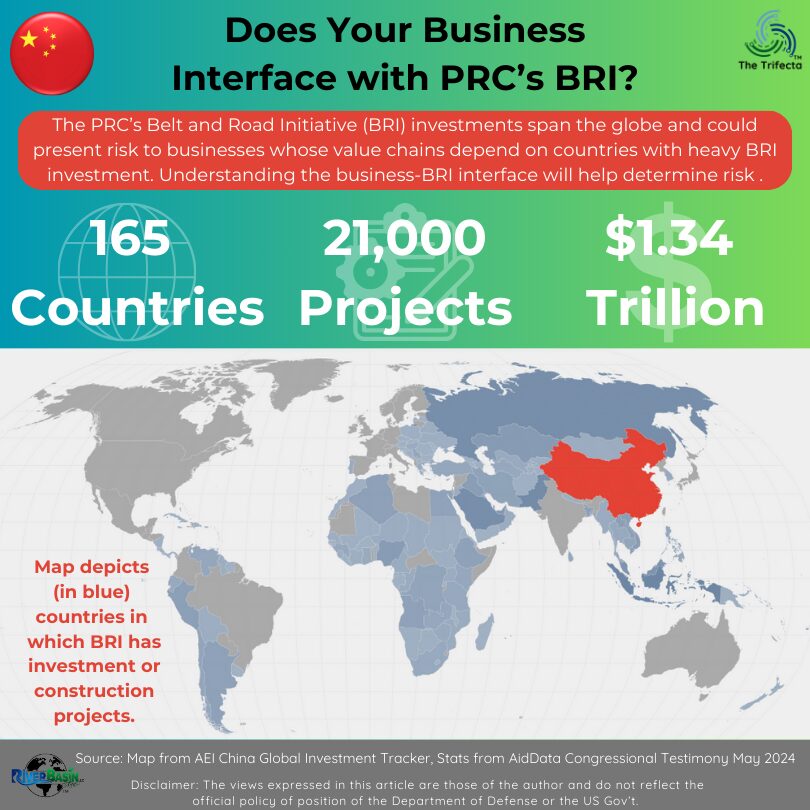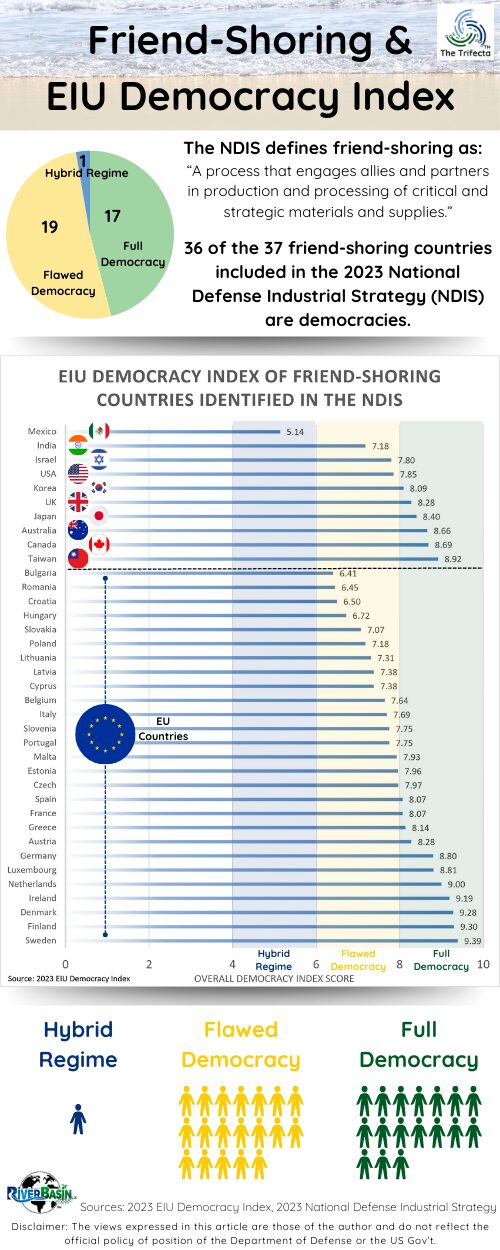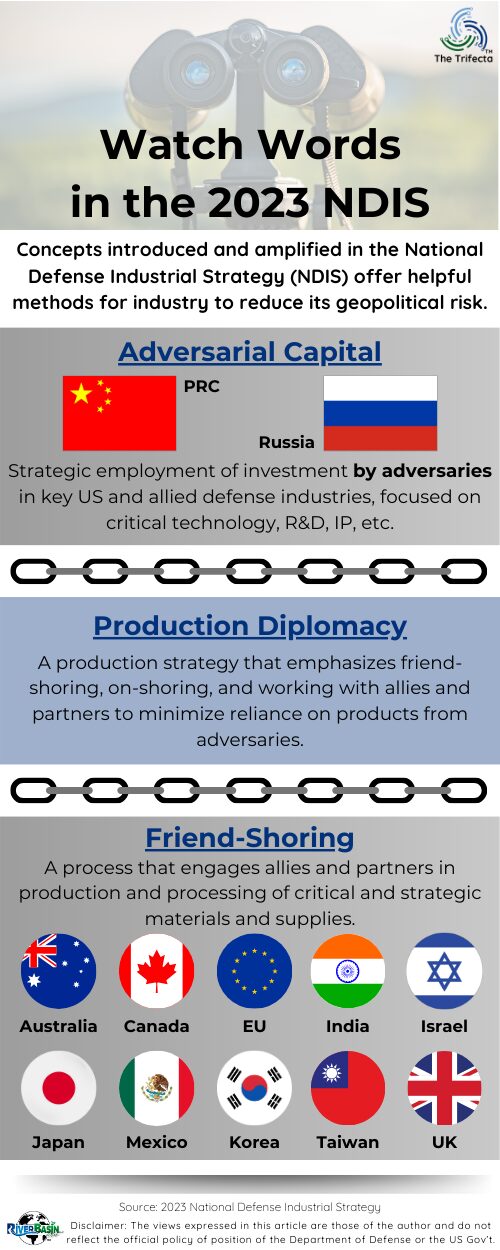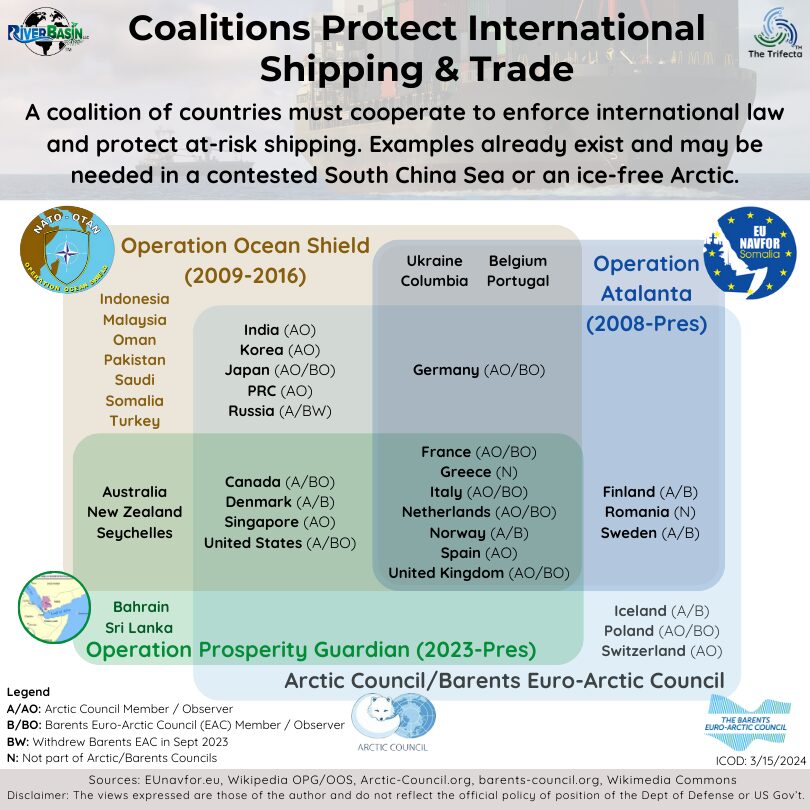Adversarial Autocracies & Friend-Shoring
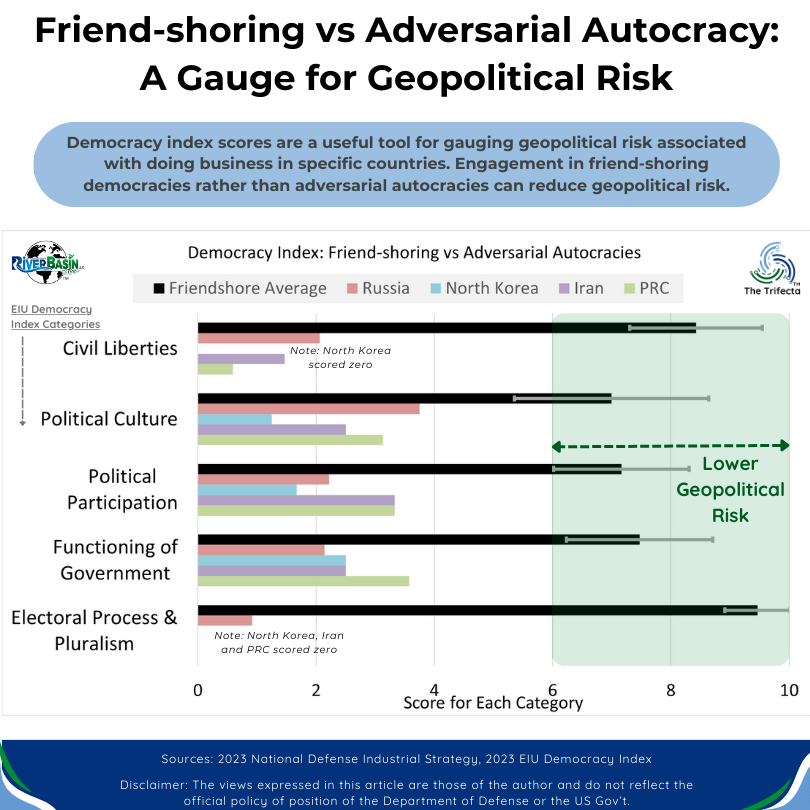
BLUF
Democracy index scores are a useful tool for gauging geopolitical risk associated with doing business in specific countries. Engagement in friend-shoring democracies rather than adversarial autocracies can reduce geopolitical risk.
Why does this matter?
As energy companies grapple with new geopolitical risks, mitigation strategies can be challenging. Leveraging assessments regarding countries’ governments, policies and population treatment can provide insight into various potential geopolitical risks. When industry engages in friend-shoring countries, it enables the respective governments to enhance security, mitigate geopolitical risks, and build stronger diplomatic ties.
Note: This article builds on previous discussions about the 2023 National Defense Industrial Strategy (a primer), key phrases introduced in the NDIS, and a look at the EIU Democracy Index of the 37 friend-shoring countries identified in the NDIS.
Key Take-Aways
- Friend-shoring reduces geopolitical risk for energy companies by leveraging democracies.
- A friend-shoring country with strong electoral processes and government functions provides a stable, predictable business environment with less geopolitical risk.
- Friend-shoring countries supporting robust civil liberties present lower geopolitical risk to businesses operating there.
Disclaimers: The views expressed in this article are those of the author and do not reflect the official policy or position of the Department of Defense or the U.S. Government. The appearance of external hyperlinks does not constitute endorsement by the United States Department of Defense (DoD) of the linked websites. The DoD does not exercise any editorial, security or other control over the information you may find at these locations.
Friend-shoring reduces geopolitical risk for energy companies by leveraging democracies.
We are familiar with off-shoring, near-shoring and on-shoring (quick review here). According to the National Defense Industrial Strategy, friend-shoring means “a focus on sourcing from countries that are geopolitical allies.” It is defined as “a process that engages allies and partners in production and processing of critical and strategic materials and supplies.”
The goal of friend-shoring is to reduce reliance on adversarial or unstable nations for critical defense or strategic materials. By friend-shoring, industry reduces its geopolitical risk. The strategy prioritizes trust, cultural alignment and geopolitical considerations over cost savings alone. When industry collaborates with friendly countries, it enables the respective governments to enhance security, mitigate geopolitical risks, and build stronger diplomatic ties.
For companies, friend-shoring allows them to diversify their supply chains while promoting economic development in ally nations. This approach reinforces mutual interests, strengthens alliances, and fosters a more interconnected and resilient global economy.
Identifying what a democracy looks like is not easy.
Multiple organizations pursue this goal and there is no single evaluation system accepted as the standard. In a previous article, we looked at The World Bank’s World Governance Indicators (WGI) approach. The WGI aggregates data from over 30 think tanks, international organizations, nongovernmental organizations and private firms from around the world.
One of those sources is the Economist Intelligence Unit (EIU), which publishes a democracy index each year. This article leverages the EIU data because of its ease of use.
The Economic Intelligence Unit (EIU) Democracy Index leverages 60 indicators spread across five categories to score each country. Each of the five categories evaluates a certain aspect of democracy. A brief description of each EIU category follows:
Electoral Process and Pluralism – Related to free and fair elections, universal suffrage, the voting and campaigning process, the opportunity to form political parties, the opportunity to take part in the political process or hold public office.
Functioning of Government – Related to if the elected government is the body that determines policy and is free of influence from outside actors (i.e., foreign governments or organizations, military, interest groups), accountability or checks and balances, corruption, government worker motivation and capability, and public perception of government.
Political Participation – Related to voter turnout, minority representation in the process and government, citizen engagement in the process (including demonstrations), adult literacy, and government encouragement of the population to take part.
Political Culture – Related to societal cohesion to underpin the democratic system, the population’s leadership preference (e.g., powerful leader, military rule, technocrat leader), separation between Church and state, population’s support of democracy.
Civil Liberties – Related to freedom of speech (e.g., media, protest, expression, diversity of views), access to professional organizations, unions, internet; use of torture by the state, freedom of religious expression, independence of judiciary, extent of personal freedoms, extent of discrimination based on race, color, religion, gender; public perception of basic human rights protections.
When examining the graphic above, the black bars illustrate the average score in each category across all 37 friend-shoring countries identified in the 2023 NDIS. The grey bar reflects the standard deviation within the friend-shoring data set. The other colored bars depict country-specific scores of four adversarial autocracies across each category.
A friend-shoring country with strong electoral processes and government functions provides a stable, predictable business environment with less geopolitical risk.
“Electoral process and pluralism” is the category with a most significant difference between friend-shoring countries and adversarial autocracies.
The PRC, Iran and North Korea each scored zero in this category, while Russia scored 0.92. Such low scores show a near-complete lack of transparent and robust government forming activities. For example, elections, voting, political parties, and civic organizations are all several limited or non-existent.
In contrast, the 37 friend-shoring countries had an average of 9.46 and a standard deviation of 0.55. Across all five evaluation categories, this was the one with the largest disparity between friend-shoring countries and adversarial autocracies.
Electoral processes provide avenues for diverse voices and interests to be represented in governance. By giving all groups a stake in the political process, elections contribute to social cohesion and stability. Countries that hold free and fair elections often enjoy better diplomatic relations with other democracies, leading to increased cooperation, trade and mutual support, reducing the risk of geopolitical tensions and conflicts.
High scores of friend-shoring countries in “functioning of government” shows more accountability and less corruption.
The 37 friend-shoring countries had an average score of 7.47 and a standard deviation of 1.23. These scores show a lower level of corruption and a higher level of accountability for government behavior.
In contrast, Russia (2.14), Iran (2.50), North Korea (2.50), and the PRC (3.57), all scored much lower in this category. These scores show a higher level of corruption and a lower level of accountability for government behavior. Putin’s behavior between 2022 through 2023 provides multiple examples of geopolitical risk associated with doing business in these countries.
Accountability mechanisms inherent in the electoral process, such as public scrutiny, media coverage and opposition oversight, help deter corruption and abuse of power. This promotes good governance and reduces the risk of internal strife, reducing the risk of geopolitical tensions and conflicts.
Friend-shoring countries supporting robust civil liberties present lower geopolitical risk to businesses operating there.
Civil liberties contribute to geopolitical stability by fostering internal cohesion, building trust in institutions, promoting economic development, improving diplomatic relations, and mitigating radicalization. These countries showcase an unwavering strength in the face of geopolitical risks and possess the ability to tackle challenges.
North Korea scored zero in the “civil liberties” category. The PRC scored 0.59, Iran scored 1.47 and Russia scored 2.06. These low scores should concern any company considering business operations in those countries. The scores represent a government that represses its people and does not uphold basic human rights.
The 37 friend-shoring countries had an average “civil liberties” score of 8.43 and a standard deviation of 1.12. This category had the second highest score and the second lowest standard deviation. Stated more plainly, friend-shoring countries provide more freedoms to their populations.

DOPSR 24-P-0577
Think About It…
- What criteria does your company use when considering foreign investments or vendors?
- In the last 3-5 years, what operational disruptions due to internal stability has your company experienced?
- How confident are you about the predictability of foreign governments where you do business?
- What business investments or operations do you have in autocratic countries?
- How disruptive would it be to your company if you lost control of your assets in autocratic countries?


